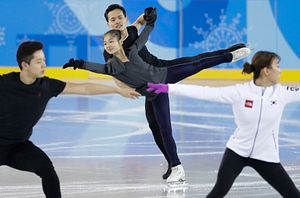The opening ceremony for the PyeongChang Winter Olympics is set to kick off on February 9. All eyes will be on the Korean Peninsula – not only for the Games themselves, but also to observe North Korea’s participation, worked out in a recent flurry of diplomacy. Dr. Leif-Eric Easley, an associate professor of international studies at Ewha University in Seoul, addresses several of the most-asked questions about North Korea and the Winter Olympics.
By participating in the Winter Olympics, does North Korea intend to drive a wedge between South Korea and the United States?
North Korea’s leaders would like to weaken the U.S.-South Korea alliance, but this narrative perhaps frames too much media coverage of recent events. The Kim regime also seeks to buy time for its arms build-up, find ways to reduce diplomatic pressure and sanctions enforcement, and take advantage of propaganda opportunities to bolster domestic legitimacy.
Policy coordination between the U.S. and South Korea remains close. President Moon Jae-in gave credit to President Donald Trump’s pressure campaign for pushing Pyongyang into talks with Seoul. The U.S. strongly supports the Winter Games at PyeongChang. Working-level communication between the allies is frequent and effective. There is stated agreement about implementing sanctions and continuing military exercises. And, as U.S. alliance managers favor trilateral cooperation with Seoul and Tokyo, they will be glad to see President Moon meet Japan’s Prime Minister Shinzo Abe on the sidelines of the Olympics.
Is North Korea’s charm offensive working on the South Korean public?
South Koreans welcome the reduction in tensions. The Olympics will likely include symbols of inter-Korean reconciliation, from the two national teams walking into the opening ceremony under a unification flag, to the joint efforts of the combined women’s ice hockey team, to moving performances of the unofficial inter-Korean anthem, “Arirang.” The Moon administration hopes this atmosphere of cooperation will continue after the Olympics to allow for separated family reunions, humanitarian programs, and enduring lines of communication.
However, if the Kim regime is trying to win hearts and minds in South Korea, it is not succeeding thus far. The South Korean public is showing little patience for North Korean unprofessionalism and sense of entitlement in the last-minute organizing of joint appearances during the Olympics. The South Korean taxpayer expects the costs of incorporating North Korean participation to be transparent. Even the biggest fans of sports diplomacy do not want to legitimize a regime that contradicts the Olympic spirit with nuclear missile development and human rights abuses.
Is the Trump administration raising North Korean human rights issues to push back against Pyongyang’s charm offensive and pressure Kim Jong-un?
President Trump highlighted North Korean human rights in his State of the Union address and met with North Korean escapees at the White House in early February. While this may improve public understanding of the North Korean threat and increase international support for efforts to isolate the regime, U.S. attention to human rights is not just about pressuring Kim Jong-un. Many in the U.S. government are aware of the plight of the North Korean people and wish to support their freedoms.
Moreover, human rights issues are connected to international security. For example, the Kim regime exports slave labor to fund its nuclear and missile programs. Additionally, U.S. attention to human rights sends signals to other members of the long-stalled Six-Party Talks. It says to China and Russia that temporary and tactical changes to North Korean behavior are insufficient; it reassures Tokyo that Japan will not be left out on a limb dealing with North Korea; and it reminds Seoul that while coordinated engagement is desirable, no one should give the Kim regime a blank check for the sake of conflict avoidance and dialogue.
How might diplomatic efforts unfold during the Olympics?
U.S. Vice President Mike Pence is almost certain to stress North Korean human rights issues, not just in his public and private remarks, but also with the symbolism of whom he travels with and meets while in South Korea. North Korea could use this as an excuse to cancel some cooperation or respond belligerently. More likely, Pyongyang will blame U.S.-South Korea military exercises and economic sanctions for its next nuclear or missile test, sometime after the Olympics.
In light of recently strained ties between South Korea and China — and news that Xi Jinping and Li Keqiang will not attend the Olympics — Abe scores a win for Japan just by showing up. But he also faces criticism from domestic hardliners who perceive Moon as undermining a 2015 reconciliation agreement. If the unification flag displayed at the Olympics includes Dokdo (an islet controlled by South Korea but claimed by Japan as Takeshima), that could spoil the cooperation expected to come out of the Moon-Abe summit on February 9. Some versions of the unification flag include Dokdo in its cartographic depiction of the Korean Peninsula, but the one attached to the International Olympic Committee document outlining inter-Korean cooperation at the Winter Games does not include the island.
Finally, while North Korean participation lowers the chance of a military provocation during the Olympics, something could go wrong with the North Korean delegation. There is a non-zero probability that North Koreans will get into a scuffle with athletes or protesters, or that some might disappear while in South Korea. If North Korea sends its nominal head of state, 90-year-old Kim Yong-nam, and he has a health emergency at PyeongChang, that would be an international incident.
Despite the uncertainties, the South Korean hosts have worked very hard for the success of the Winter Games. Hopefully PyeongChang manages to be a “peace Olympics” where achievements of the athletes are the main storylines, and progress toward reconciliation offers a basis for further diplomacy.
Leif-Eric Easley (Ph.D. in Government, Harvard University) is associate professor in the Division of International Studies at Ewha University and an international research fellow at the Asan Institute for Policy Studies in Seoul. Another version of this commentary appeared via the CSIS Korea Chair Platform.

































